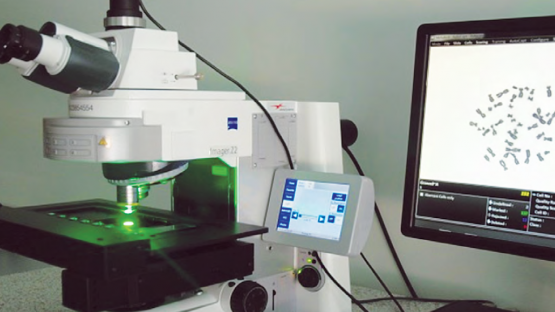A laboratory in Lithuania built to help deal with radiological emergencies is branching out to cancer research. The laboratory’s scientists, initially trained by the IAEA to measure people’s overexposure to radiation at work or in case of a nuclear or radiological accident, are now using the same method and equipment to study radiosensitivity: cancer patients’ susceptibility to ionizing radiation. They expect the research to eventually lead to more effective, personalized radiotherapy treatment.
“Accidents involving overexposure to radioactive sources are rare,” said Julius Ziliukas, in charge of exposure monitoring at the Radiation Protection Centre in the capital, Vilnius. “And not fully exploiting the great potential of this laboratory in other fields would be a pity”.
With the proximity of nuclear facilities, including in Ignalina, where a power plant is planned to be decommissioned, Lithuania’s Radiation Protection Centre initially asked the IAEA for support in establishing a laboratory that could measure accidental overexposure to radiation. Construction of the laboratory was completed in 2011.
IAEA experts visited the country shortly after the laboratory was finalized to verify that the right emergency preparedness and response equipment was in place and to train two junior professionals hired by the Radiation Protection Centre to work in the laboratory. Supported by the IAEA, the two specialists travelled to France, Germany, Greece and the Netherlands to learn from experienced colleagues at institutions advanced in biodosimetry (see box below).
They soon found that the methods and equipment they worked with in preparation for a radiological emergency could also be applied to measuring patients’ reactions to radiotherapy. A few months later collaboration with university hospitals to optimize cancer treatment started: Ziliukas and his team began working on measuring individuals’ sensitivity to the harmful effects of ionizing radiation. This new area of work will generate income to keep the laboratory’s scientists and equipment up to date, and is expected to help hone radiotherapy treatment in the future.
“Emergency preparedness and response infrastructure requires continuous maintenance,” said Alessia Rodriguez y Baena, IAEA programme manager responsible for the project that helped establish the laboratory. “Lithuania found an excellent way to maintain this lab and optimize its use”.
Accidents involving overexposure to radioactive sources are rare, and not fully exploiting the great potential of this laboratory in other fields would be a pity.



